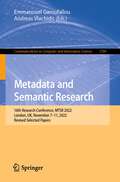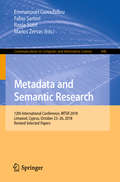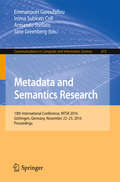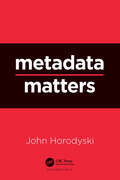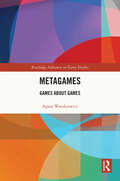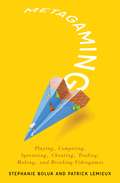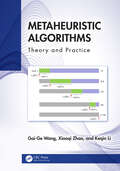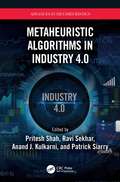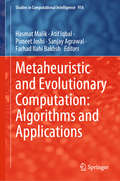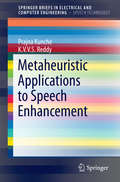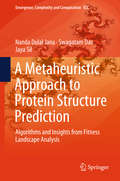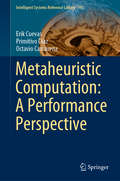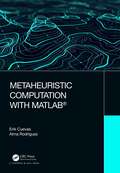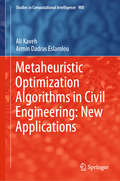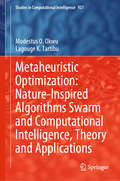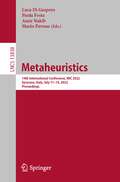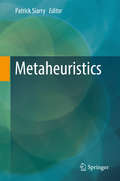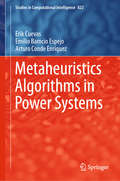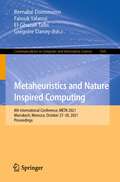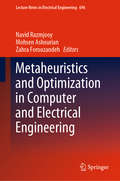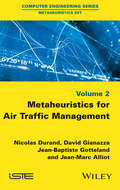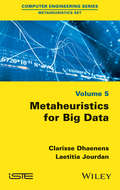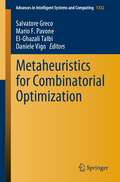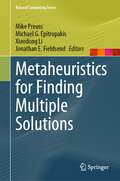- Table View
- List View
Metadata and Semantic Research: 16th Research Conference, MTSR 2022, London, UK, November 7–11, 2022, Revised Selected Papers (Communications in Computer and Information Science #1789)
by Emmanouel Garoufallou Andreas VlachidisThis book constitutes the refereed post proceedings of the 16th Research Conference onMetadata and Semantic Research, MTSR 2022, held in London, UK, during November 7–11, 2022.The 21 full papers and 4 short papers included in this book were carefully reviewed andselected from 79 submissions. They were organized in topical sections as follows: metadata, linked data, semantics and ontologies - general session, and track on Knowledge IT Artifacts (KITA), Track on digital humanities and digital curation, and track on cultural collections and applications, track on digital libraries, information retrieval, big, linked, social & open data, and metadata, linked data, semantics and ontologies - general session, track on agriculture, food & environment, and metadata, linked Data, semantics and ontologies - general, track on open repositories, research information systems & data infrastructures, and metadata, linked data, semantics and ontologies - general, metadata, linked data, semantics and ontologies - general session, and track on european and national projects.
Metadata and Semantic Research: Third International Conference, Mtsr 2009, Milan, Italy, October 1-2, 2009. Proceedings (Communications in Computer and Information Science #46)
by Marios Zervas Rania Siatri Fabio Sartori Emmanouel GaroufallouThis book constitutes the thoroughly refereed proceedings of the 12th International Conference on Metadata and Semantic Research, MTSR 2018, held in Limassol, Cyprus, on October 23-26, 2018. The 19 full and 16 short papers presented were carefully reviewed and selected from 77 submissions. The papers are organized in topical sections on metadata, linked data, semantics, ontologies and SKOS; digital libraries, information retrieval, big, linked, social and open data; cultural collections and applications; Knowledge IT Artifacts (KITA) in professional communities and aggregations; Digital Humanities and Digital Curation (DHC); European and national projects; agriculture, food and environment; open repositories, research information systems and data infrastructures.
Metadata and Semantics Research: 10th International Conference, MTSR 2016, Göttingen, Germany, November 22-25, 2016, Proceedings (Communications in Computer and Information Science #672)
by Emmanouel Garoufallou, Imma Subirats Coll, Armando Stellato and Jane GreenbergThis book constitutes the refereed proceedings of the 10th Metadata and Semantics Research Conference, MTSR 2016, held in Göttingen, Germany, in November 2016. The 26 full papers and 6 short papers presented were carefully reviewed and selected from 67 submissions. The papers are organized in several sessions and tracks: Digital Libraries, Information Retrieval, Linked and Social Data, Metadata and Semantics for Open Repositories, Research Information Systems and Data Infrastructures, Metadata and Semantics for Agriculture, Food and Environment, Metadata and Semantics for Cultural Collections and Applications, European and National Projects.
Metadata and Semantics Research
by Emmanouel Garoufallou Imma Subirats Coll Armando Stellato Jane GreenbergThis book constitutes the refereed proceedings of the 9th Metadata and Semantics Research Conference, MTSR 2015, held in Manchester, UK, in September 2015. The 35 full papers and 3 short papers presented together with 2 poster papers were carefully reviewed and selected from 76 submissions. The papers are organized in several sessions and tracks: general track on ontology evolution, engineering, and frameworks, semantic Web and metadata extraction, modelling, interoperability and exploratory search, data analysis, reuse and visualization; track on digital libraries, information retrieval, linked and social data; track on metadata and semantics for open repositories, research information systems and data infrastructure; track on metadata and semantics for agriculture, food and environment; track on metadata and semantics for cultural collections and applications; track on European and national projects.
Metadata Matters
by John Horodyski"In what is certain to be a seminal work on metadata, John Horodyski masterfully affirms the value of metadata while providing practical examples of its role in our personal and professional lives. He does more than tell us that metadata matters—he vividly illustrates why it matters." —Patricia C. Franks, PhD, CA, CRM, IGP, CIGO, FAI, President, NAGARA, Professor Emerita, San José State University, USA If data is the language upon which our modern society will be built, then metadata will be its grammar, the construction of its meaning, the building for its content, and the ability to understand what data can be for us all. We are just starting to bring change into the management of the data that connects our experiences. Metadata Matters explains how metadata is the foundation of digital strategy. If digital assets are to be discovered, they want to be found. The path to good metadata design begins with the realization that digital assets need to be identified, organized, and made available for discovery. This book explains how metadata will help ensure that an organization is building the right system for the right users at the right time. Metadata matters and is the best chance for a return on investment on digital assets and is also a line of defense against lost opportunities. It matters to the digital experience of users. It helps organizations ensure that users can identify, discover, and experience their brands in the ways organizations intend. It is a necessary defense, which this book shows how to build.
Metagames: Games about Games (ISSN)
by Agata WaszkiewiczMetagames: Games about Games scrutinizes how various meta devices, such as breaking the fourth wall and unreliable narrator, change and adapt when translated into the uniquely interactive medium of digital games.Through its theoretical analyses and case studies, the book shows how metafictional experimentation can be used to both challenge and push the boundaries of what a game is and what a player’s role is in play, and to raise more profound topics such as those describing experiences of people of oppressed identities. The book is divided into six chapters that deal with the following meta devices: breaking the fourth wall, hypermediation, unreliable narrator, abusive game design, fragmentation, and parody.The book will predominantly interest scholars and students of media studies and game studies as it continues discourses held in the discipline regarding the metareferential character of digital games.
Metagaming: Playing, Competing, Spectating, Cheating, Trading, Making, and Breaking Videogames (Electronic Mediations #53)
by Patrick Lemieux Stephanie BolukThe greatest trick the videogame industry ever pulled was convincing the world that videogames were games rather than a medium for making metagames. Elegantly defined as “games about games,” metagames implicate a diverse range of practices that stray outside the boundaries and bend the rules: from technical glitches and forbidden strategies to Renaissance painting, algorithmic trading, professional sports, and the War on Terror. In Metagaming, Stephanie Boluk and Patrick LeMieux demonstrate how games always extend beyond the screen, and how modders, mappers, streamers, spectators, analysts, and artists are changing the way we play.Metagaming uncovers these alternative histories of play by exploring the strange experiences and unexpected effects that emerge in, on, around, and through videogames. Players puzzle through the problems of perspectival rendering in Portal, perform clandestine acts of electronic espionage in EVE Online, compete and commentate in Korean StarCraft, and speedrun The Legend of Zelda in record times (with or without the use of vision). Companies like Valve attempt to capture the metagame through international e-sports and online marketplaces while the corporate history of Super Mario Bros. is undermined by the endless levels of Infinite Mario, the frustrating pranks of Asshole Mario, and even Super Mario Clouds, a ROM hack exhibited at the Whitney Museum of American Art.One of the only books to include original software alongside each chapter, Metagaming transforms videogames from packaged products into instruments, equipment, tools, and toys for intervening in the sensory and political economies of everyday life. And although videogames conflate the creativity, criticality, and craft of play with the act of consumption, we don’t simply play videogames—we make metagames.
Metaheuristic Algorithms: Theory and Practice
by Gai-Ge Wang Xiaoqi Zhao Keqin LiThis book introduces the theory and applications of metaheuristic algorithms. It also provides methods for solving practical problems in such fields as software engineering, image recognition, video networks, and in the oceans.In the theoretical section, the book introduces the information feedback model, learning-based intelligent optimization, dynamic multi-objective optimization, and multi-model optimization. In the applications section, the book presents applications of optimization algorithms to neural architecture search, fuzz testing, oceans, and image processing. The neural architecture search chapter introduces the latest NAS method. The fuzz testing chapter uses multi-objective optimization and ant colony optimization to solve the seed selection and energy allocation problems in fuzz testing. In the ocean chapter, deep learning methods such as CNN, transformer, and attention-based methods are used to describe ENSO prediction and image processing for marine fish identification, and to provide an overview of traditional classification methods and deep learning methods.Rich in examples, this book will be a great resource for students, scholars, and those interested in metaheuristic algorithms, as well as professional practitioners and researchers working on related topics.
Metaheuristic Algorithms in Industry 4.0 (Advances in Metaheuristics)
by Pritesh Shah Ravi Sekhar Anand J. Kulkarni Patrick SiarryDue to increasing industry 4.0 practices, massive industrial process data is now available for researchers for modelling and optimization. Artificial Intelligence methods can be applied to the ever-increasing process data to achieve robust control against foreseen and unforeseen system fluctuations. Smart computing techniques, machine learning, deep learning, computer vision, for example, will be inseparable from the highly automated factories of tomorrow. Effective cybersecurity will be a must for all Internet of Things (IoT) enabled work and office spaces. This book addresses metaheuristics in all aspects of Industry 4.0. It covers metaheuristic applications in IoT, cyber physical systems, control systems, smart computing, artificial intelligence, sensor networks, robotics, cybersecurity, smart factory, predictive analytics and more. Key features: Includes industrial case studies. Includes chapters on cyber physical systems, machine learning, deep learning, cybersecurity, robotics, smart manufacturing and predictive analytics. surveys current trends and challenges in metaheuristics and industry 4.0. Metaheuristic Algorithms in Industry 4.0 provides a guiding light to engineers, researchers, students, faculty and other professionals engaged in exploring and implementing industry 4.0 solutions in various systems and processes.
Metaheuristic and Evolutionary Computation: Algorithms and Applications (Studies in Computational Intelligence #916)
by Hasmat Malik Atif Iqbal Puneet Joshi Sanjay Agrawal Farhad Ilahi BakhshThis book addresses the principles and applications of metaheuristic approaches in engineering and related fields. The first part covers metaheuristics tools and techniques such as ant colony optimization and Tabu search, and their applications to several classes of optimization problems. In turn, the book’s second part focuses on a wide variety of metaheuristics applications in engineering and/or the applied sciences, e.g. in smart grids and renewable energy. In addition, the simulation codes for the problems discussed are included in an appendix for ready reference.Intended for researchers aspiring to learn and apply metaheuristic techniques, and gathering contributions by prominent experts in the field, the book offers readers an essential introduction to metaheuristics, its theoretical aspects and applications.
Metaheuristic Applications to Speech Enhancement
by Prajna Kunche K. V. V. S. ReddyThis book serves as a basic reference for thoseinterested in the application of metaheuristics to speech enhancement. Themajor goal of the book is to explain the basic concepts of optimization methodsand their use in heuristic optimization in speech enhancement to scientists,practicing engineers, and academic researchers in speech processing. Theauthors discuss why it has been a challenging problem for researchers todevelop new enhancement algorithms that aid in the quality and intelligibilityof degraded speech. They present powerful optimization methods to speechenhancement that can help to solve the noise reduction problems. Readers willbe able to understand the fundamentals of speech processing as well as theoptimization techniques, how the speech enhancement algorithms are implementedby utilizing optimization methods, and will be given the tools to develop newalgorithms. The authors also provide a comprehensive literature surveyregarding the topic.
A Metaheuristic Approach to Protein Structure Prediction: Algorithms And Insights From Fitness Landscape Analysis (Emergence, Complexity And Computation Ser. #31)
by Nanda Dulal Jana Swagatam Das Jaya SilThis book introduces characteristic features of the protein structure prediction (PSP) problem. It focuses on systematic selection and improvement of the most appropriate metaheuristic algorithm to solve the problem based on a fitness landscape analysis, rather than on the nature of the problem, which was the focus of methodologies in the past. Protein structure prediction is concerned with the question of how to determine the three-dimensional structure of a protein from its primary sequence. Recently a number of successful metaheuristic algorithms have been developed to determine the native structure, which plays an important role in medicine, drug design, and disease prediction. This interdisciplinary book consolidates the concepts most relevant to protein structure prediction (PSP) through global non-convex optimization. It is intended for graduate students from fields such as computer science, engineering, bioinformatics and as a reference for researchers and practitioners.
Metaheuristic Computation: A Performance Perspective (Intelligent Systems Reference Library #195)
by Erik Cuevas Primitivo Diaz Octavio CamarenaThis book is primarily intended for undergraduate and postgraduate students of Science, Electrical Engineering, or Computational Mathematics. Metaheuristic search methods are so numerous and varied in terms of design and potential applications; however, for such an abundant family of optimization techniques, there seems to be a question which needs to be answered: Which part of the design in a metaheuristic algorithm contributes more to its better performance? Several works that compare the performance among metaheuristic approaches have been reported in the literature. Nevertheless, they suffer from one of the following limitations: (A)Their conclusions are based on the performance of popular evolutionary approaches over a set of synthetic functions with exact solutions and well-known behaviors, without considering the application context or including recent developments. (B) Their conclusions consider only the comparison of their final results which cannot evaluate the nature of a good or bad balance between exploration and exploitation. The objective of this book is to compare the performance of various metaheuristic techniques when they are faced with complex optimization problems extracted from different engineering domains. The material has been compiled from a teaching perspective.
Metaheuristic Computation with MATLAB®
by Erik Cuevas Alma RodriguezMetaheuristic algorithms are considered as generic optimization tools that can solve very complex problems characterized by having very large search spaces. Metaheuristic methods reduce the effective size of the search space through the use of effective search strategies. Book Features: Provides a unified view of the most popular metaheuristic methods currently in use Includes the necessary concepts to enable readers to implement and modify already known metaheuristic methods to solve problems Covers design aspects and implementation in MATLAB® Contains numerous examples of problems and solutions that demonstrate the power of these methods of optimization The material has been written from a teaching perspective and, for this reason, this book is primarily intended for undergraduate and postgraduate students of artificial intelligence, metaheuristic methods, and/or evolutionary computation. The objective is to bridge the gap between metaheuristic techniques and complex optimization problems that profit from the convenient properties of metaheuristic approaches. Therefore, engineer practitioners who are not familiar with metaheuristic computation will appreciate that the techniques discussed are beyond simple theoretical tools, since they have been adapted to solve significant problems that commonly arise in such areas.
Metaheuristic Optimization Algorithms in Civil Engineering: New Applications (Studies in Computational Intelligence #900)
by Ali Kaveh Armin Dadras EslamlouThis book discusses the application of metaheuristic algorithms in a number of important optimization problems in civil engineering. Advances in civil engineering technologies require greater accuracy, efficiency and speed in terms of the analysis and design of the corresponding systems. As such, it is not surprising that novel methods have been developed for the optimal design of real-world systems and models with complex configurations and large numbers of elements. This book is intended for scientists, engineers and students wishing to explore the potential of newly developed metaheuristics in practical problems. It presents concepts that are not only applicable to civil engineering problems, but can also used for optimizing problems related to mechanical, electrical, and industrial engineering. It is an essential resource for civil, mechanical and electrical engineers who use optimization methods for design, as well as for students and researchers interested in structural optimization.
Metaheuristic Optimization: Nature-Inspired Algorithms Swarm and Computational Intelligence, Theory and Applications (Studies in Computational Intelligence #927)
by Modestus O. Okwu Lagouge K. TartibuThis book exemplifies how algorithms are developed by mimicking nature. Classical techniques for solving day-to-day problems is time-consuming and cannot address complex problems. Metaheuristic algorithms are nature-inspired optimization techniques for solving real-life complex problems. This book emphasizes the social behaviour of insects, animals and other natural entities, in terms of converging power and benefits. Major nature-inspired algorithms discussed in this book include the bee colony algorithm, ant colony algorithm, grey wolf optimization algorithm, whale optimization algorithm, firefly algorithm, bat algorithm, ant lion optimization algorithm, grasshopper optimization algorithm, butterfly optimization algorithm and others. The algorithms have been arranged in chapters to help readers gain better insight into nature-inspired systems and swarm intelligence. All the MATLAB codes have been provided in the appendices of the book to enable readers practice how to solve examples included in all sections. This book is for experts in Engineering and Applied Sciences, Natural and Formal Sciences, Economics, Humanities and Social Sciences.
Metaheuristics: 14th International Conference, MIC 2022, Syracuse, Italy, July 11–14, 2022, Proceedings (Lecture Notes in Computer Science #13838)
by Luca Di Gaspero Paola Festa Amir Nakib Mario PavoneThis book constitutes the refereed proceedings of the 14th International Conference on Metaheuristics, MIC 2022, held in Syracuse, Italy, in July 2022.The 48 full papers together with 17 short papers presented were carefully reviewed and selected from 72 submissions. The papers detail metaheuristic techniques.
Metaheuristics
by Patrick SiarryMetaheuristics exhibit desirable properties like simplicity, easy parallelizability, and ready applicability to different types of optimization problems. After a comprehensive introduction to the field, the contributed chapters in this book include explanations of the main metaheuristics techniques, including simulated annealing, tabu search, evolutionary algorithms, artificial ants, and particle swarms, followed by chapters that demonstrate their applications to problems such as multiobjective optimization, logistics, vehicle routing, and air traffic management. The authors are leading researchers in this domain, with considerable teaching and applications experience, and the book will be of value to industrial practitioners, graduate students, and research academics.
Metaheuristics Algorithms in Power Systems (Studies in Computational Intelligence #822)
by Erik Cuevas Emilio Barocio Espejo Arturo Conde EnríquezThis book discusses the use of efficient metaheuristic algorithms to solve diverse power system problems, providing an overview of the various aspects of metaheuristic methods to enable readers to gain a comprehensive understanding of the field and of conducting studies on specific metaheuristic algorithms related to power-system applications. By bridging the gap between recent metaheuristic techniques and novel power system methods that benefit from the convenience of metaheuristic methods, it offers power system practitioners who are not metaheuristic computation researchers insights into the techniques, which go beyond simple theoretical tools and have been adapted to solve important problems that commonly arise. On the other hand, members of the metaheuristic computation community learn how power engineering problems can be translated into optimization tasks, and it is also of interest to engineers and application developers. Further, since each chapter can be read independently, the relevant information can be quickly found. Power systems is a multidisciplinary field that addresses the multiple approaches used for design and analysis in areas ranging from signal processing, and electronics to computational intelligence, including the current trend of metaheuristic computation.
Metaheuristics and Nature Inspired Computing: 8th International Conference, META 2021, Marrakech, Morocco, October 27-30, 2021, Proceedings (Communications in Computer and Information Science #1541)
by Farouk Yalaoui Grégoire Danoy Bernabé Dorronsoro El-Ghazali TalbiThis volume constitutes selected papers presented during the 8th International Conference on Metaheuristics and Nature Inspired Computing, META 2021, held in Marrakech, Morocco, in October 201. Due to the COVID-19 pandemic the conference was partiqally held online. The 16 papers were thoroughly reviewed and selected from the 53 submissions. They are organized in the topical sections on combinatorial optimization; continuous optimization; optimization and machine learning; applications.
Metaheuristics and Optimization in Computer and Electrical Engineering (Lecture Notes in Electrical Engineering #696)
by Navid Razmjooy Mohsen Ashourian Zahra ForoozandehThe use of artificial intelligence, especially in the field of optimization is increasing day by day. The purpose of this book is to explore the possibility of using different kinds of optimization algorithms to advance and enhance the tools used for computer and electrical engineering purposes.
Metaheuristics for Air Traffic Management
by Jean-Marc Alliot Jean-Baptiste Gotteland Nicolas Durand David GianazzaAir Traffic Management involves many different services such as Airspace Management, Air Traffic Flow Management and Air Traffic Control. Many optimization problems arise from these topics and they generally involve different kinds of variables, constraints, uncertainties. Metaheuristics are often good candidates to solve these problems. The book models various complex Air Traffic Management problems such as airport taxiing, departure slot allocation, en route conflict resolution, airspace and route design. The authors detail the operational context and state of art for each problem. They introduce different approaches using metaheuristics to solve these problems and when possible, compare their performances to existing approaches
Metaheuristics for Big Data
by Laetitia Jourdan Clarisse DhaenensThis book deals with the management and valuation of energy storage in electric power grids, highlighting the interest of storage systems in grid applications and developing management methodologies based on artificial intelligence tools. The authors highlight the importance of storing electrical energy, in the context of sustainable development, in "smart cities" and "smart transportation", and discuss multiple services that storing electrical energy can bring. Methodological tools are provided to build an energy management system storage following a generic approach. These tools are based on causal formalisms, artificial intelligence and explicit optimization techniques and are presented throughout the book in connection with concrete case studies.
Metaheuristics for Combinatorial Optimization (Advances in Intelligent Systems and Computing #1332)
by Salvatore Greco Mario F. Pavone El-Ghazali Talbi Daniele VigoThis book presents novel and original metaheuristics developed to solve the cost-balanced traveling salesman problem. This problem was taken into account for the Metaheuristics Competition proposed in MESS 2018, Metaheuristics Summer School, and the top 4 methodologies ranked are included in the book, together with a brief introduction to the traveling salesman problem and all its variants. The book is aimed particularly at all researchers in metaheuristics and combinatorial optimization areas. Key uses are metaheuristics; complex problem solving; combinatorial optimization; traveling salesman problem.
Metaheuristics for Finding Multiple Solutions (Natural Computing Series)
by Mike Preuss Michael G. Epitropakis Xiaodong Li Jonathan E. FieldsendThis book presents the latest trends and developments in multimodal optimization and niching techniques. Most existing optimization methods are designed for locating a single global solution. However, in real-world settings, many problems are “multimodal” by nature, i.e., multiple satisfactory solutions exist. It may be desirable to locate several such solutions before deciding which one to use. Multimodal optimization has been the subject of intense study in the field of population-based meta-heuristic algorithms, e.g., evolutionary algorithms (EAs), for the past few decades. These multimodal optimization techniques are commonly referred to as “niching” methods, because of the nature-inspired “niching” effect that is induced to the solution population targeting at multiple optima. Many niching methods have been developed in the EA community. Some classic examples include crowding, fitness sharing, clearing, derating, restricted tournament selection, speciation, etc. Nevertheless, applying these niching methods to real-world multimodal problems often encounters significant challenges.To facilitate the advance of niching methods in facing these challenges, this edited book highlights the latest developments in niching methods. The included chapters touch on algorithmic improvements and developments, representation, and visualization issues, as well as new research directions, such as preference incorporation in decision making and new application areas. This edited book is a first of this kind specifically on the topic of niching techniques.This book will serve as a valuable reference book both for researchers and practitioners. Although chapters are written in a mutually independent way, Chapter 1 will help novice readers get an overview of the field. It describes the development of the field and its current state and provides a comparative analysis of the IEEE CEC and ACM GECCO niching competitions of recent years, followed by a collection of open research questions and possible research directions that may be tackled in the future.
